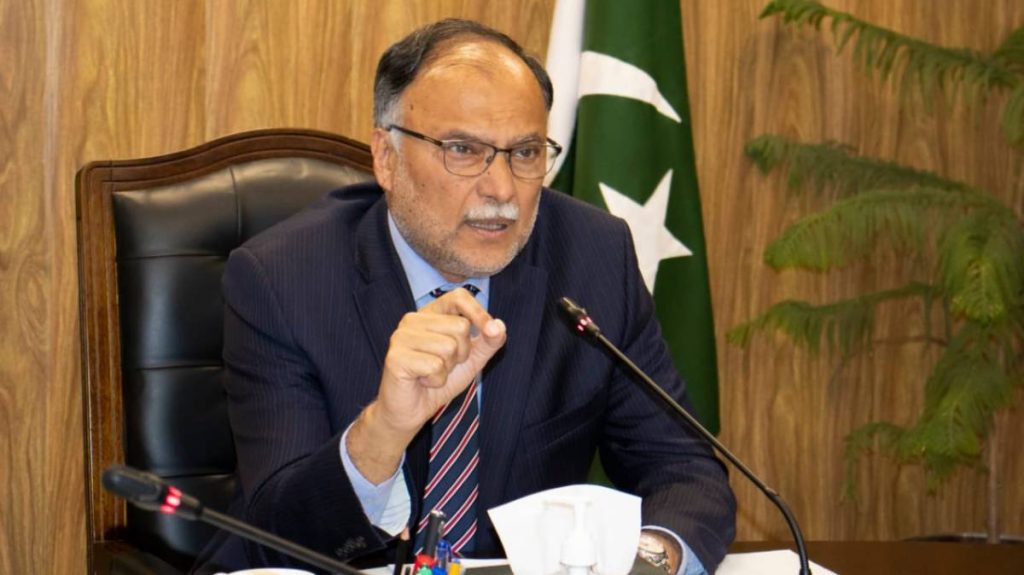Over 118 unnecessary or low-priority projects have been discontinued: Ahsan Iqbal
ISLAMABAD ( WEB NEWS )
Federal Minister for Planning, Development, and Special Initiatives Ahsan Iqbal Chaudhry has stated that more than half of the national budget will be spent on debt repayment, and over 118 unnecessary or low-priority projects have been discontinued.
Ahsan Iqbal was addressing a key meeting of the Annual Plan Coordination Committee (APCC), which he chaired. The meeting was attended by Federal Minister Dr. Khalid Maqbool Siddiqui, various federal secretaries, representatives from the State Bank of Pakistan, provincial governments, national and provincial institutions, and other senior officials.
Chief Economist Dr. Imtiaz briefed participants on the upcoming annual development plan, economic roadmap, and priority targets.
In his speech, Ahsan Iqbal said that due to the economic challenges of recent years, the consistent decline in the national development budget has become a major issue.
“Expanding development funds is the need of the hour, as citizens expect improvements in health, education, water, electricity, and infrastructure from elected governments,” he added.
He pointed out that managing the development budget within current resources has become extremely difficult, with more than half of the federal budget going towards debt repayment. The development budget for the current fiscal year is set at Rs1,000 billion, making it impossible to include projects from all ministries.
He emphasized that reduced development budgets present challenges to economic growth, public welfare, and achieving national goals. Ahsan Iqbal stressed the urgent need for a nationwide campaign to curb tax evasion and expand the tax net, noting that Pakistan has one of the lowest tax revenue-to-GDP ratios in the world.
The minister revealed that over 118 inactive or low-priority projects have already been terminated, and only key national projects are being prioritized under the limited funds. Foreign-funded projects also remain a top priority in the Public Sector Development Programme (PSDP).
He announced that major projects like the Diamer-Bhasha Dam, Sukkur-Hyderabad Motorway, Chaman Road, and Phase II of the Karakoram Highway are of national importance, and their timely completion is vital for Pakistan’s future.
The Minister for Planning emphasized the need for greater synergy between the development projects of the center and the provinces for early completion of national priority projects.
Ahsan Iqbal said that projects with foreign component and those nearing completion have also been prioritized in the PSDP. He said allocations for special regions such as AJK, Gilgit Baltistan and the tribal districts have also been prioritized.
He said that an effort has been made to align the development budget with national priorities while staying within limited resources.
Ahsan Iqbal also highlighted that under the “Uraan Pakistan” program, workshops are being organized across all provinces to promote national cohesion. He acknowledged the need to increase the development budget over time rather than shrink it further.
He remarked that in 2018, the government was planning new projects, but today it is faced with tough decisions to cut down ongoing ones.
“Everyone must fulfill their responsibility towards national development. If any project has been left out, we apologize in advance,” he concluded.
Ahsan Iqbal emphasized to invest in the future to strengthen economy to ensure country’s defence impregnable. He said the future investments need to be focused on modernizing infrastructure, conserving water and facing challenges like the water security and climate change.
The Minister said the Pakistani youth will have to prepare itself for technological revolution in the world. He added that broadening tax base and addressing tax evasion are vital for a robust economy and achieving targets. He called for coordinated efforts between the people and the government to promote tax culture in the country and raising tax to GDP ratio for existing ten percent to 18 percent.

